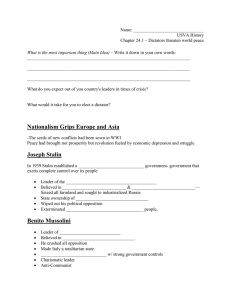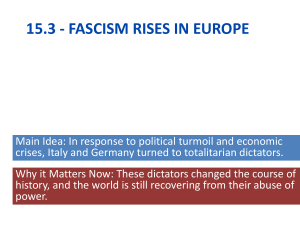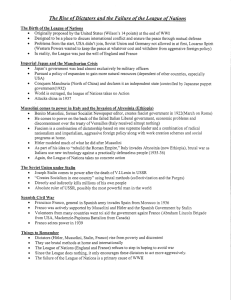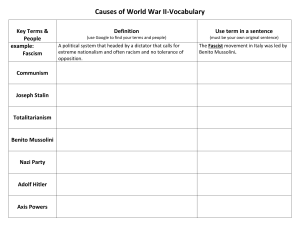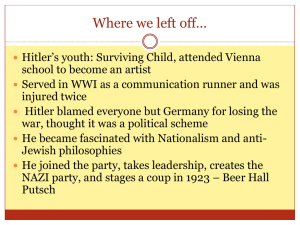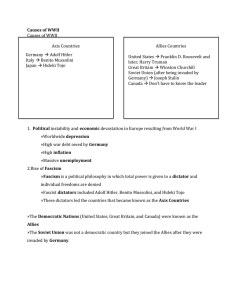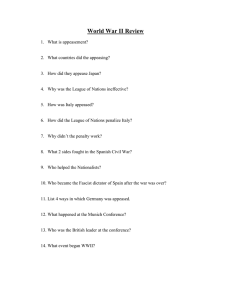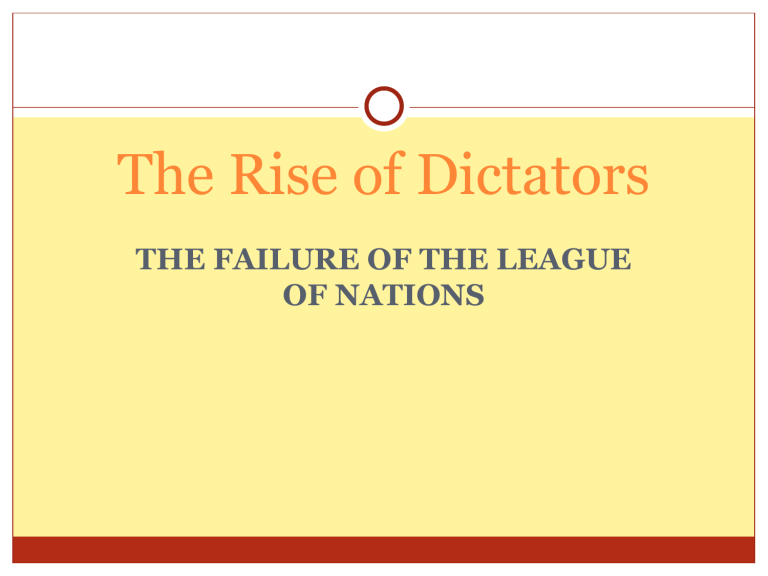
The Rise of Dictators THE FAILURE OF THE LEAGUE OF NATIONS The Failure of the League of Nations League of Nations - Maintain peace through collective security - Encourage international cooperation to solve economic social issues The Birth of the League of nations Originally proposed by the United States at the end of WWI (Wilson’s 14 points) Designed to be a place to discuss international conflict and ensure peace through mutual defense Flawed from beginning - USA didn’t join - Soviet Union and Germany were not allowed in - The Spirit of Locarno (avoid war at all costs) Discussion: Groups 1) What was the Treaty of Versailles? What happened to Germany? 2) What is the National Socialism Worker’s party, why were they formed? What did they want? 3) How did he take power? Totalitarianism - A term used to describe a political system in which the state holds total authority over the society - seeks to control all aspects of public and private life wherever possible - Totalitarian regimes seek to establish complete political, social and cultural control. Dictators Usually… They are quite intelligent (Sometimes) They are power Hungry Charismatic They take power during Crisis They promise a better Future They are patriots- Proud They rage RAGE WAR They terrorize OUR FIRST TOTALITARIAN REGIME What country is this? Japan Imperialism - Overpopulated - Wanted territorial expansion - Unhappy with the Treaty of Versailles - Emperor Hirohito - Strong military leadership Imperial Japan In the 1930’s, Japan’s government was lead by the Military Driven by their lack of natural resources and their dependence on foreign trade (American Trade) Japan attempted to expand its empire into Asia SO.. In 1931, Japan conquers Manchuria (North of China) In 1937, Japan attacks mainland China The Japanese were not very kind (like most totalitarian regimes) Japan’s Imperialism 1931: Manchuria 1933: storms out of League of Nations 1937: invades China 1938: at war with China 1940: Axis Pact with Germany and Italy 1941: Pearl Harbor attack Rape of Nanking, 1937 - Full-scale Japanese invasion of China - In systematic attacks on port city after surrender - 300,000 civilians killed - 80,000 women raped Japanese Atrocities The Japanese Imperial Army was extremely brutal in their treatment of the enemy They routinely killed prisoners of war, murdered civilians, and used chemical and biological weapons against defenseless people The world was outraged but the League of Nations did NOTHING to stop them OUR NEXT DICTATOR IS Benito Mussolini Fascist Italy Benito Mussolini Comes to power in Italy after the “March on Rome” in 1922 He is riding the people’s anger over Italy’s treatment at the treaty of Versailles, crushing poverty and a failing Italian government Mussolini creates fascism – a combination of dictatorship (one person in charge) Nationalism / Militarism / Imperialism Mussolini become wildly popular (Social Programs) served as a model for Hitler and other dictators Fascism is: Fascism: the country is considered more important than any one person, group, liberty, or provision. Their race is the master race One leader They support labor Unions (in theory) They allow private economy but they control it Created because they thought democracy was weak. What does the symbol mean? This is an ancient Imperial Roman symbol of power A bundle of sticks featuring an axe, indicating the power over life and death Benito Mussolini - “Il Duce” (the leader) - Blackshirts - organized violence. - Takes power through “March on Rome” 1922 - Fascist: Goal to revive Roman Empire 1935 - Italy invades Abyssinia (Ethiopia) As part of his idea to “rebuild the Roman Empire” Mussolini invades Ethiopia (the last free African State) The Ethiopians have few advanced weapons The Italians became frustrated with the lack of progress and decided to force Ethiopia’s surrender by attacking civilians Hundreds of thousands are killed as the Italians bomb and shell innocent people in their homes. Again, the world is outraged but nothing is done to stop the horror and the League of Nations does NOTHING! Italy invades Abyssinia 1935 NEXT UP: Joseph Stalin Joseph Stalin comes to power in the Soviet Union (Russia) Perhaps the most brutal dictator in history Imprisons and kills millions of his own people Communism Ideology is based on common ownership of the means of production. The Bolsheviks during the Russian Revolution took charge. This was the starting point of Soviet Marxism and the beginning of modern communism. Fascism vs. Communism Differences Fascism Communism Extremely nationalistic (Fascism is for the good of a particular country alone.) - Internationalist (Communists believe their system should spread throughout the world.) Does not seek a “classless society”. Made up of aristocrats, industrialists, war veterans, and lower middle class. - Seeks a “classless society” - Made up of urban working lower classes (Russia) and peasants (China). Spanish Civil War (1936-1939) Francisco Franco (Spanish General) Invades Spain from Morocco A civil war begins in Spain! Franco’s military (Fascist supporters) vs Spanish communist supporters Italy and German sent troops and weapons to help Franco’s army Soviet Union (Russia)sent troops and weapons to help Spanish Communists Franco’s army wins the war and seizes power in Spain in 1939 Important for Germany, preparation for war to come! REMEMBER THE LEAGUE OF NATIONS IS NOT DOING A DAMN THING Rise of Fascism in Germany and Italy The Treaty of Versailles - Germany responsible for paying billions of dollars in reparations - Germany forced to demilitarize and give up some of its territory - “War Guilt Clause”- take responsibility for WW2 The Nazi Party • • • • National Socialist German Workers Party (NAZI) German nationalists Fascists Believed that Communists, liberals, and Jews were responsible for Germany’s problems Hitler Violates the Treaty of Versailles - Conscription and rearmament - Remilitarization of Rhineland - Secret development of air force & Navy - Anschluss of Austria 1938 - Take over of Sudetenland (Czechoslovakia) The Nazi –Soviet Non-Aggression Pact ■ Shocked the world! ■ On Aug 23, 1939 the two enemies agreed not to go to war ■ Also they secretly agreed to divide up Poland In Summary Dictators (Franco, Mussolini, Hitler etc.) rise to power They use brutal methods at home and against other nations The League of Nations does not have the strength or will power to stop them Since these dictators are not stopped, they only become more bold and aggressive The failure of the League of Nations to act created a situation where dictators eventually gained so much power that it took a full scale war to stop them League of Nations Reasons for Failure? • Lacking USA leadership • Defeated nations and Russia excluded • No military force used • Challenges by Italy, Germany, Japan • Munich Appeasement - League members unwilling to impose serious economic sanctions or use armed forces
